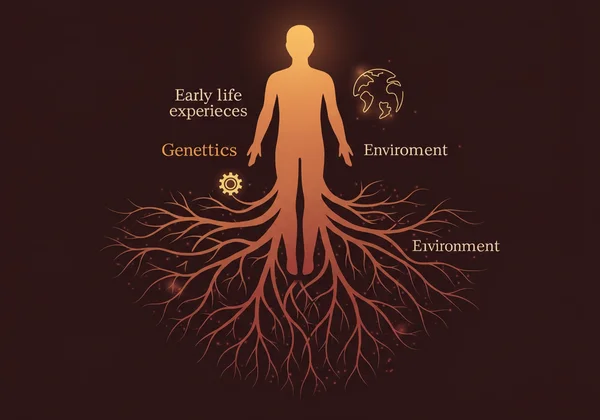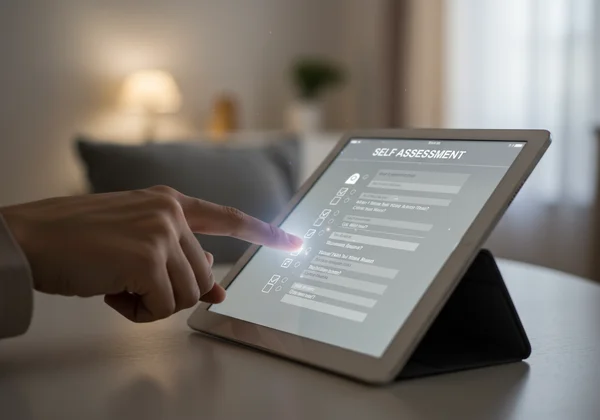Dependent Personality Disorder Test: DPD Symptoms & Support
October 11, 2025 | By Samuel Bishop
Do you find yourself struggling with everyday decisions, constantly seeking reassurance, or feeling lost and anxious when you're alone? These feelings can be overwhelming, leaving you to wonder about the underlying patterns in your life. If you've ever asked, how do I check if I have a personality disorder?, you've already taken a step toward self-awareness. This article delves into Dependent Personality Disorder (DPD), explaining its core traits and how a confidential dependent personality disorder test can offer the initial clarity you seek.
Understanding these patterns is the first step toward building confidence and fostering healthier relationships. We will explore the common symptoms of DPD and guide you on how a scientifically-informed screening tool can provide valuable insights into your emotional world. This journey of discovery can empower you to understand yourself better and explore pathways to growth. If you are ready to begin, you can start your free test at any time.
What is Dependent Personality Disorder (DPD)?
Dependent Personality Disorder (DPD) is characterized by a pervasive and excessive need to be taken care of, leading to submissive behaviors and a profound fear of separation. Individuals with DPD often feel they cannot function without others' help, making independent choices incredibly difficult.
This pattern is more than simple clinginess; it's a distressing reliance on others for nearly all emotional and practical support. Unlike healthy interdependence, where autonomy is maintained, DPD involves a blurred sense of self, often tied directly to a key relationship. The core issue is a deep-seated lack of self-confidence and a belief that they are incapable of managing life alone. This can lead to tolerating poor treatment just to avoid being abandoned. Gaining clarity is a significant step, and a personality disorder test can be a helpful tool in this process.

Key DSM-5 Aligned Criteria for DPD
To provide a clearer picture, mental health professionals often refer to criteria from the Diagnostic and Statistical Manual of Mental Disorders (DSM-5). While our screening is not a diagnostic tool, it is informed by these established standards to provide relevant insights. Some of the core criteria associated with DPD include:
- Difficulty making everyday decisions without an excessive amount of advice and reassurance from others.
- Needing others to assume responsibility for most major areas of their life.
- Difficulty expressing disagreement with others because of fear of loss of support or approval.
- Trouble initiating projects or doing things on their own due to a lack of self-confidence.
- Going to excessive lengths to obtain nurturance and support from others.
- Feeling uncomfortable or helpless when alone because of exaggerated fears of being unable to care for themselves.
- Urgently seeking another relationship as a source of care and support when a close relationship ends.
Recognizing DPD Symptoms: Signs You Might Be Experiencing
Identifying the signs of DPD in your own life can feel daunting, but it is a courageous act of self-reflection. These symptoms often manifest as persistent patterns of thought and behavior that impact your daily functioning, relationships, and overall well-being. Understanding these signs can help you connect the dots and see why you might feel the way you do.
Exploring these symptoms with an open mind is key. Remember, many people experience some of these traits occasionally. The concern with DPD is when these behaviors are pervasive, long-standing, and cause significant distress. An online screening test can help you organize your thoughts and see if your experiences align with these patterns.

Difficulty Making Decisions & Initiating Tasks
For someone with DPD traits, even simple choices like what to wear or what to eat can feel paralyzing without input from others. This indecisiveness stems from a deep-seated lack of trust in their own judgment. They may constantly second-guess themselves, fearing they will make the "wrong" choice and face disapproval or negative consequences.
This extends to bigger life decisions and initiating projects. Whether it’s applying for a new job or starting a hobby, a person with DPD may feel unable to move forward without someone else taking the lead. This isn't due to a lack of motivation but rather an overwhelming fear of failure and a core belief that they are not equipped to handle things on their own.
Excessive Need for Reassurance & Approval
A constant need for validation is a hallmark of DPD. Individuals often look to others to confirm that their choices, thoughts, and feelings are correct. They might repeatedly ask questions like, "Are you sure this is okay?" or "Do you think I did a good job?" This need for reassurance is not just for major decisions but can permeate all aspects of their daily life.
This pattern is driven by an underlying anxiety that they will be abandoned or rejected if they don't meet others' expectations. Their self-worth is often externally defined, making praise and approval feel essential for their emotional stability. Without it, they may feel lost, anxious, and deeply insecure about their own identity and capabilities.
The Fear of Being Alone and Helpless
One of the most profound struggles for someone with DPD is an intense fear of being alone. Solitude is not experienced as a peaceful or restorative time but as a threatening state of vulnerability. This fear is rooted in the belief that they are incapable of caring for themselves, both practically and emotionally.
This can lead to behaviors such as immediately seeking a new relationship after one ends or staying in unhealthy dynamics to avoid the prospect of being alone. The thought of having to navigate the world without a key person to lean on can trigger significant anxiety and a feeling of complete helplessness.
What Causes DPD? Exploring Potential Factors
The development of DPD is believed to be a complex interplay of various factors. Understanding these potential roots is not about placing blame but about fostering compassion for oneself and recognizing the deep-seated nature of these patterns.

Early Life Experiences & Attachment Styles
Childhood experiences significantly shape personality. DPD traits may stem from an overprotective environment that discouraged independence or from experiences of trauma or chronic illness that fostered helplessness. Additionally, an insecure or anxious attachment style with early caregivers can create a blueprint for dependency in later relationships.
Genetic and Biological Predispositions
Research suggests a genetic component to personality disorders. A family history of DPD or other anxiety disorders can increase predisposition. Inherited traits like high agreeableness or a tendency toward anxiety may also contribute to its development.
Taking the First Step: How a DPD Screening Test Can Help
If you recognize yourself in the descriptions above, the idea of taking action can feel overwhelming. However, a simple, confidential online screening can be an empowering first step. It provides a structured way to explore your feelings and behaviors without pressure or judgment. This is a chance for private self-reflection, and you can get initial insights in just a few minutes.

Why an Online Screening is a Valuable Starting Point
An online screening is not a diagnosis, but it is an invaluable tool for self-awareness. It offers a confidential and accessible way to see if your personal experiences align with the known traits of DPD. Our scientifically-informed screening is designed to be comprehensive yet user-friendly, providing you with initial insights that can help you decide on your next steps. It removes the barrier of scheduling an appointment and allows you to explore these questions from the comfort of your own home.
What Happens After Your DPD Assessment?
After completing the questions, you will receive a free summary of your results. This report highlights potential areas of concern based on your responses, offering you a clearer picture of your behavioral and emotional patterns. From there, you have options. You can use these insights as a starting point for a conversation with a mental health professional. For a more in-depth look, you can also choose to unlock an AI-driven detailed report, which offers personalized analysis and actionable guidance. The goal is to provide you with the information you need to move forward on your path to well-being.
Embracing Growth and Seeking Support
Taking the first step toward understanding Dependent Personality Disorder is a powerful act of self-awareness. If the challenges of decision-making, the constant need for reassurance, or the profound fear of being alone resonate with your experiences, know that these are not weaknesses but deeply ingrained patterns that can be explored and transformed. This journey toward self-discovery is a testament to your courage.
You don't have to navigate these complex feelings in isolation. A confidential online screening can provide the initial clarity and validation you need, helping you connect the dots between your experiences and potential DPD traits. Our free personality disorder test is here to offer you a supportive starting point, designed to help you explore these aspects of yourself further. Begin your path toward greater self-understanding, independence, and personal well-being today.
Frequently Asked Questions About Dependent Personality Disorder & Testing
How do I check if I have Dependent Personality Disorder (DPD)?
A formal diagnosis can only be made by a qualified mental health professional, such as a psychologist or psychiatrist. However, a great starting point is to take a confidential online screening test. Our free DPD screening is designed to help you identify potential traits and patterns associated with DPD, providing you with valuable insights to discuss with a professional.
What is the most accurate personality disorder test for DPD?
The "gold standard" for diagnosis is a clinical evaluation by a professional. However, for initial self-assessment, the most helpful tests are those that are scientifically-informed and based on established criteria like the DSM-5. This personality disorder test is designed with these principles in mind to serve as a reliable preliminary screening tool, not a diagnostic one.
At what age do personality disorders like DPD usually develop?
Personality disorders typically begin to manifest during adolescence or early adulthood. The patterns of thinking, feeling, and behaving associated with DPD often become more consistent over time. A formal diagnosis is usually not given until an individual is 18 years or older, as personality is still developing during the teenage years.
Can people with DPD live a normal life?
Absolutely. With self-awareness, support, and often through therapy like cognitive-behavioral therapy (CBT), individuals with DPD can learn to build self-confidence, develop healthier coping mechanisms, and foster more independent and fulfilling relationships. Treatment helps individuals challenge core beliefs about their helplessness and learn to trust their own judgment, leading to a much-improved quality of life.